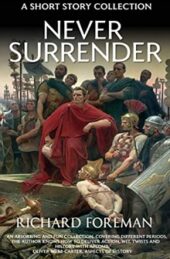Richard, our favourite reluctant spy and even more reluctant poet Rufus Varro is back – and there’s been a murder. Why was Assassin a story you wanted to add to the Spies of Rome series?
I partly wanted to write a novella that was in the mold of Steven Saylor’s Roma Sub Rosa series. His books were a source of inspiration and information to me many years ago – and now. I worked as a publicist in my thirties and was fortunate enough to meet Steven. I’m pleased to say that he was as smart, fun and decent as I hoped he would be.
There are plenty of ingredients in Assassin which contribute towards a classic murder mystery. We open with a dead body. There’s an array of suspects. An engaging protagonist conducts an investigation, which involves both breadcrumbs and red herrings. Hopefully the reveal at the end will surprise and satisfy some people too.
Assassin is the third book in a series of novellas which features the character of Rufus Varro. Quite a few readers have written to me over the years to say they wanted him to head up more books. I also enjoy writing him.
Could someone who wanted to get into Spies of Rome use Assassin as an entry point? What should they know about the characters and the series beforehand?
Yes. I’m mindful that all of my books, which feature as part of a series, can also be read as stand alones – although hopefully the series are also greater than the sum of their parts. I’d be disappointed if they proved less than the sum of their parts.
The action in all the novellas take place after the events in Spies of Rome: Blood and Honour. Rufus Varro may be a reluctant spy – he’s far lazier and more indifferent than most heroes – but he still gets drawn into events and is compelled to finish any assignment. Being a patrician and poet, Varro is comfortable in the upper echelons of society – but he is equally happy, perhaps too happy, frequenting taverns and brothels. There are plenty of reoccurring characters throughout the (so far) six books, including Varro’s bodyguard, Manius, a former gladiator and Briton, Varro’s ex-wife, Lucilla, and Marcus Agrippa. But each book had its own coterie of colourful characters, which span different aspects of Roman society. The books feature both politicians and pimps, though some may argue that those professions do not differ too much.
There’s not a great deal one needs to know beforehand about the series. The stories are set during the reign of Augustus, involving elements of crime and spy fiction. Marcus Agrippa, Caesar’s spymaster and lieutenant, gives Varro various assignments, which he often unhappily and unwillingly accepts. There are three novels in the series, and now three novellas.
What can long-time fans of the series hope to discover in Assassin?
They’ll be given more of the same. At the heart of the story is a mystery. They’ll be elements of satire, casting light on Roman society (and, to some extent, our age too). There will be blood, too.
One of the new characters introduced in Assassin is Clara Balbina, a former actress. Was she based on a real figure from ancient times?
Clara isn’t based on one particular actress or figure from history. Actresses seducing those in power (or being seduced by such figures or by power itself) is a story which occurs throughout history. Marc Antony was enamoured with the actress Cytheris. JFK was fond of one or two – or ten or more – actresses as well. Acting may be considered the second oldest profession.
Clara is more than just a stereotype though. She needed to be special – smart, witty and beautiful – to attract Varro’s attention. She may well way turn up again in a future story.
You write a lot of historical fiction, covering different time periods and characters. Is it easy to step back into the mind of Rufus Varro after writing about, say, Dick Turpin or the Hundred Years War?
I don’t think about it too much, which is why I may find it easy. I try to take a short time and breath out between series, partly to do some research and sketch out characters and plots. Some characters are easier to write than others – and some, like Marcus Aurelius, Henry V and Bohemond of Taranto, I’m basing on historical records. History provides the framework. There are also those, like Dick Turpin, who are figures from history that you write about using a certain amount of poetic licence.
Will your next project be a return to Ancient Rome or an entirely different era?
I’ll be returning to Ancient Rome sooner or later – and I wouldn’t discount myself writing another Spies of Rome book – but the next book I’ll be working on is the second novel in the Men-At-Arms series (the first one being Crecy), based around the Black Prince. There is a character in the book who is a spy however, so there will be an element of espionage in the story. I’m also due to write a modern thriller to finish off another series. That will keep me busy for a year or two I imagine. Rome wasn’t built in a day.
Richard Foreman is a bestselling writer and the author of
.






